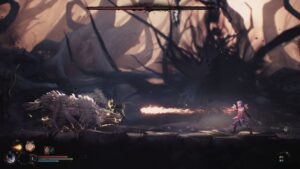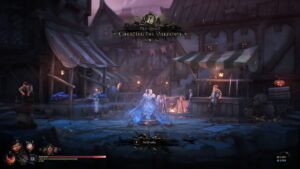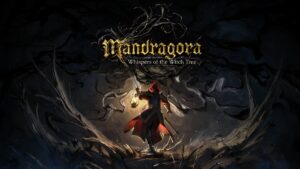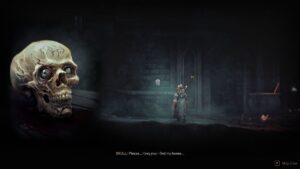
Mandragora: Whispers of the Witch Tree – A Darkly Beautiful Adventure
Mandragora: Whispers of the Witch Tree, developed by Primal Game Studio and published by Knights Peak Interactive, is an ambitious 2.5D action RPG that blends Metroidvania exploration with Soulslike combat, set in the haunting world of Faelduum. Released on April 17, 2025, for PC, PlayStation 5, Xbox Series X/S, and Nintendo Switch, this dark fantasy epic promises over 40 hours of gameplay, six unique classes, and a painterly art style that evokes both beauty and dread. After diving into its gothic landscapes and brutal battles, we found Mandragora to be a compelling yet flawed experience, excelling in atmosphere and world-building but stumbling with repetitive combat and clunky platforming.
 Mandragora transports players to Faelduum, a crumbling realm ravaged by Entropy, a dark force that spawns grotesque creatures and corrupts reality. You play as an Inquisitor, initially loyal to the tyrannical Priest King, who defies orders by sparing a tortured witch, setting off on a quest to hunt another while unraveling the world’s sinister truths. The narrative, penned by Brian Mitsoda, is a highlight, weaving a branching tale of moral ambiguity, body horror, and societal decay. The story doesn’t reinvent the genre but captivates with its oppressive tone and troubling choices, such as deciding the fate of NPCs or absorbing Entropy, which feels like a risky gamble with consequences yet to unfold.
Mandragora transports players to Faelduum, a crumbling realm ravaged by Entropy, a dark force that spawns grotesque creatures and corrupts reality. You play as an Inquisitor, initially loyal to the tyrannical Priest King, who defies orders by sparing a tortured witch, setting off on a quest to hunt another while unraveling the world’s sinister truths. The narrative, penned by Brian Mitsoda, is a highlight, weaving a branching tale of moral ambiguity, body horror, and societal decay. The story doesn’t reinvent the genre but captivates with its oppressive tone and troubling choices, such as deciding the fate of NPCs or absorbing Entropy, which feels like a risky gamble with consequences yet to unfold.
Faelduum’s 75 unique locations, from festering swamps to vampire-infested castles, are visually striking, enhanced by a painterly art style that shines in cutscenes and character portraits. The FILMharmonic Orchestra Prague’s haunting soundtrack, composed by Christos Antoniou, complements the gothic aesthetic, with eerie strings and surreal sound effects amplifying the atmosphere. However, the environments can feel generic during exploration, lacking the distinctiveness of genre peers like Hollow Knight or Prince of Persia: The Lost Crown. Despite this, the world feels alive, with NPCs at the Witch Tree hub offering side quests and upgrades, adding depth to the caravan of characters you recruit.
 At its core, Mandragora is a Soulslike, emphasizing stamina management, dodge rolls, and precise timing in combat. Players choose from six classes—Vanguard, Flameweaver, Spellbinder, Nightshade, Wyldwarden, and Vindicator—each with distinct skill trees and playstyles. I opted for the Nightshade, an assassin relying on daggers and poison, which promised agility but felt underwhelming in early encounters due to limited abilities (only two per loadout) and occasional input delays with skills like Shadowstep. The combat is accessible, with melee attacks, parries, and spells, but it lacks the depth of genre heavyweights. Fights against regular enemies often feel rote, and while bosses demand pattern recognition, their high-damage attacks can feel unfair, bordering on one-shot kills that frustrate rather than challenge.
At its core, Mandragora is a Soulslike, emphasizing stamina management, dodge rolls, and precise timing in combat. Players choose from six classes—Vanguard, Flameweaver, Spellbinder, Nightshade, Wyldwarden, and Vindicator—each with distinct skill trees and playstyles. I opted for the Nightshade, an assassin relying on daggers and poison, which promised agility but felt underwhelming in early encounters due to limited abilities (only two per loadout) and occasional input delays with skills like Shadowstep. The combat is accessible, with melee attacks, parries, and spells, but it lacks the depth of genre heavyweights. Fights against regular enemies often feel rote, and while bosses demand pattern recognition, their high-damage attacks can feel unfair, bordering on one-shot kills that frustrate rather than challenge.
The talent trees are a standout, offering hundreds of upgrades from increased health to bleed damage boosts, allowing for build customization. After level 15, you can dip into other classes’ trees, though this requires careful planning to avoid diluting your build. Crafting and equipment systems are robust, letting you forge weapons and gear to suit your playstyle, but the scarcity of materials like linen cloth can halt progress, as noted by players on Steam. While the combat grows more engaging with unlocked skills, the early hours drag, and the lack of enemy variety doesn’t help. For Soulslike veterans, the difficulty (adjustable in settings) may feel inconsistent, with some encounters punishingly tough and others too easy.
 Mandragora’s Metroidvania elements encourage exploration across interconnected maps, with shortcuts, secret areas, and abilities like a grapple hook or floor-breaking power unlocking new paths. The map system is functional, allowing custom markers for backtracking, but the platforming is a weak link. Jumping sections, especially in Entropy-rift areas, feel clunky, with imprecise controls leading to frequent deaths from mistimed leaps. Unlike Prince of Persia: The Lost Crown, where platforming is integral to puzzles and combat, Mandragora’s traversal feels like an afterthought, often an inconvenience rather than a rewarding challenge. The lack of engaging puzzles or memorable platforming sequences further diminishes this aspect.
Mandragora’s Metroidvania elements encourage exploration across interconnected maps, with shortcuts, secret areas, and abilities like a grapple hook or floor-breaking power unlocking new paths. The map system is functional, allowing custom markers for backtracking, but the platforming is a weak link. Jumping sections, especially in Entropy-rift areas, feel clunky, with imprecise controls leading to frequent deaths from mistimed leaps. Unlike Prince of Persia: The Lost Crown, where platforming is integral to puzzles and combat, Mandragora’s traversal feels like an afterthought, often an inconvenience rather than a rewarding challenge. The lack of engaging puzzles or memorable platforming sequences further diminishes this aspect.
Exploration is bolstered by 60 quests, ranging from main story objectives to NPC-driven side missions, which reward crafting materials and lore. Hidden treasures and optional bosses add replayability, but the sparse enemy density in some areas disrupts pacing, making long stretches feel empty. The game’s New Game Plus mode promises tougher challenges, but the core exploration loop needs more polish to rival genre benchmarks.
While Mandragora boasts stunning visuals on PC at max settings, it’s not without issues. Some players reported bugs, such as NPCs failing to restock crafting materials or abilities misfiring, though these didn’t significantly impact my playthrough. More concerning are community discussions on Steam and Reddit about the game’s EULA, which initially allowed data sharing with third parties like Amazon, raising privacy concerns. The developers updated the EULA to address this, and antivirus Trojan alerts were confirmed as false positives, but the controversy left a sour taste for some, reflected in the game’s Mixed (64%) Steam rating from 904 reviews.
 Mandragora: Whispers of the Witch Tree is a visually arresting and narratively rich action RPG that captures the bleak allure of a Soulslike Metroidvania. Its painterly art, haunting soundtrack, and deep progression systems make Faelduum a world worth exploring, especially for fans of gothic horror and moral dilemmas. However, repetitive combat, clunky platforming, and occasional technical hiccups prevent it from reaching the heights of genre giants. With a 40-hour campaign, six classes, and New Game Plus, there’s plenty to sink your teeth into, but the experience feels uneven, particularly in its early hours.
Mandragora: Whispers of the Witch Tree is a visually arresting and narratively rich action RPG that captures the bleak allure of a Soulslike Metroidvania. Its painterly art, haunting soundtrack, and deep progression systems make Faelduum a world worth exploring, especially for fans of gothic horror and moral dilemmas. However, repetitive combat, clunky platforming, and occasional technical hiccups prevent it from reaching the heights of genre giants. With a 40-hour campaign, six classes, and New Game Plus, there’s plenty to sink your teeth into, but the experience feels uneven, particularly in its early hours.
For Soulslike and Metroidvania enthusiasts, Mandragora offers a rewarding challenge, provided you’re willing to overlook its flaws. Primal Game Studio has crafted a promising debut, and with patches to address combat polish and platforming, Mandragora could solidify its place in the genre. For now, it’s a dark, beautiful journey that doesn’t always live up to its lofty ambitions.

